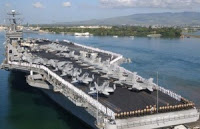 |
| USS John C. Stennis |
Madison Ruppert, Contributing Writer
Activist Post
I truly wish that this situation would fizzle out and I could stop writing these articles, but unfortunately it only seems to be getting more heated, so I feel increasingly obligated to continue this in-depth series. Now let’s move on to the latest developments in this worrisome war of words which very well might be leading to a real war.
Some troubling statements were published recently by the Iranian Fars News Agency (FNA) coming directly from Iran’s military. Lieutenant Commander of the Iranian Army’s Self-Sufficiency Jihad, Rear Admiral Farhad Amiri, stated that one of the United States’ largest concerns should be Iranian subsurface naval vehicles, “since Iranian submarines are noiseless and can easily evade detection as they are equipped with the sonar-evading technology” and can fire missiles and torpedoes simultaneously, according to FNA.
This statement was made even more pointed by adding that “When the submarine sits on the seabed it can easily target and hit an aircraft carrier traversing in the nearby regions.”
This is clearly a statement which is directed towards the United States given that the US has not only been moving aircraft carriers through the region in spite of Iran’s concerns, but even more importantly have actually been dispatching more aircraft carriers like the USS Abraham Lincoln to the region, as I outlined in the previous installment of this series.
Similarly, Iranian Army Commander Major General Ataollah Salehi called for the US to avoid sending back military vessels to the Persian Gulf earlier this month.
This came after the massive Iranian naval drills pushed Washington into moving an aircraft carrier out of the region, according to FNA.
Of course, the United States would insist that this was purely routine transport and has nothing to do with Iran whatsoever, as they repeatedly assert regarding the military movements in the region.
Salehi stated that the United States moved the carrier out of the Persian Gulf through the Strait of Hormuz into the Sea of Oman before the Iranian naval drills began.
“We advise, warn and recommend them [the US Navy] not to return this carrier to its previous location in the Persian Gulf,” Salehi said.
It is unclear what would happen if this warning is not taken seriously, and I seriously doubt that Iran would move to attack the United States unless provoked to do so, as they are well aware of the fact that it would mean a massive assault on Iran, Iranian forces and Iranian interests.
It is noteworthy to point out that Salehi didn’t mention which aircraft carrier he was actually talking about, although one can safely assume that he was referring to one of the United States Navy’s largest vessels, the USS John C. Stennis aircraft carrier.
“We are not in the habit of repeating the warning and we warn only once,” Salehi said.
It appears that one of the United States’ greatest concerns is the possibility that Iran would close the Strait of Hormuz in retaliation to Western aggressive movements due to the massive amount of oil (estimated in the range of 40% of the world’s supply) that moves through the Strait.
This capability was affirmed by General Martin Dempsey, the chairman of the US Joint Chiefs of Staff, on “Face the Nation” on CBS.
“They’ve invested in capabilities that could, in fact, for a period of time block the Strait of Hormuz,” Dempsey said.
This is a threat Iran has repeatedly made and the United States’ Fifth Fleet out of Bahrain said they would not let such a thing happen.
 Despite the rhetoric from the Western establishment media and the claims made which repeatedly say that the US Fifth Fleet on its own is more powerful than the entirety of the Iranian navy, Dempsey made it clear that in fact they do have a strategic advantage in the region.
Despite the rhetoric from the Western establishment media and the claims made which repeatedly say that the US Fifth Fleet on its own is more powerful than the entirety of the Iranian navy, Dempsey made it clear that in fact they do have a strategic advantage in the region.
In late November, Iran expanded their submarine fleet with an additional three Ghadir-class submarines (making a total of 17 according to Iran), something which likely made the United States even more concerned about their military dominance in the region.
Amiri said that the United States has focused on Iran’s “astonishing surface capabilities” and thus has ignored the power of their subsurface vehicles.
Business Insider erroneously claims that Amiri said he will move his subs onto the floor of the Persian Gulf and “fire missiles and torpedoes simultaneously,” when in fact what he was saying is that they have such a capability.
Like so much of the Western media, Business Insider seems to confuse a statement of capability or a threat with a guarantee of action.
Iran is merely asserting their dominance over the Persian Gulf in order to deter further incursions in the region on the part of the West, and to underline their threat to close the vital Strait of Hormuz.
I don’t find this to be nearly as threatening as Business Insider and others are making it out to be. Why wouldn’t any nation make it clear that they can defend themselves? This is not an act of aggression in any way and taking Amiri’s quote to mean that he “plans to … ‘fire missiles and torpedoes simultaneously,’” instead of what he was really saying which is that they have the capability is disingenuous and misleading.
The Naval Commander of the Iranian Army, Rear Admiral Habibollah Sayyari said at the time that all parts of the submarines had not only been designed but also manufactured by Iranian experts.
This military and nuclear self-sufficiency has become something that Iran brings up often, likely to point out that the West’s sanctions aren’t nearly as damaging as some may think.
Highlighting the domestic design and production of the submarines, along with the nuclear fuel rod, is something we should take note of, as such statements will likely increase as the West continues to push for sanctions and European Union ministers are set to discuss further sanctions at the end of this month.
While the United States Secretary of Defense emphasized that the United States military is fully prepared to address any threats by Iran to close the Strait of Hormuz, he claimed that they were not taking any “special steps” to bolster American forces in the region at this point.
This assertion is likely laughable to anyone who has been reading this series, as I have shown a steady effort to bolster the presence of American forces in the region along with the military capabilities of allied nations surrounding Iran.
The most glaring fact which completely contradicts Panetta’s claim is the deployment of 15,000 American troops to Kuwait.
How this does not constitute any “special steps” is beyond me, and likely is beyond anyone who is remotely capable of independent critical thought.
“We are not [taking] any special steps at this point in order to deal with the situation,” Panetta said.
“Why? Because frankly we are fully prepared to deal with that situation now,” he added.
However, this does not explain the movement of the USS Abraham Lincoln, nor the arming of neighboring states, or the massive troop movements.
It appears to me that Leon Panetta is just attempting to be boastful and nonchalant, while the statement from Dempsey reflects the fact that the United States is indeed well aware of the superior strategic positioning of Iran in the Persian Gulf and Strait of Hormuz.
Reuters cites unnamed analysts who say that the Iranian navy “does not have the size for a sustained physical blockade of the Strait, but does have mine-laying and missile capability.”
This obviously leaves out the submarine variable in this complex equation, along with the dual missile/torpedo firing capability.
It also seems to be ignoring the recent successful Iranian missile tests, including the test of a shore-to-sea anti-ship missile, which is likely designed to be able to take out American vessels in the region if a conflict were to occur.
The Reuters article marginalizes Dempsey’s affirmation that Iran could indeed close the Strait and instead highlights his expression of “confidence earlier this month that the U.S. military could reopen the strait if Iran blocked it.”
To be fair, they do cite “speculation that additional U.S. forces might be needed to do so, and U.S. media have been closely watching the movements of U.S. aircraft carrier strike groups.”
 Unsurprisingly, they fail to point out the troop movements and naval movements which are already occurring in order to prepare for such an operation.
Unsurprisingly, they fail to point out the troop movements and naval movements which are already occurring in order to prepare for such an operation.
“We have continually maintained a strong presence in the region to make very clear that we are going to do everything possible to secure the peace in that part of the world,” Panetta said.
However, to the independent observer it seems quite clear that what the United States is doing in the region is not promoting peace in any way, but is instead designed to push Iran into striking first in order to justify an all-out Western assault against the nation.
With so many undeclared conflicts (or wars depending on how you define the term) going on at once, the United States and the West in general cannot afford another public relations problem.
Having Iran strike first would get much of the international community behind the West and thus give them free license to utterly destroy Iran with impunity.
Yesterday FNA also reported that Ramin Mehman-Parast, the Iranian Foreign Ministry’s Spokesman, said that a recent letter from the United States regarding the Strait of Hormuz does not signal any new development in American-Iranian ties.
“No new development has happened with regard to Iran-US ties,” Mehman-Parast told reporters in Tehran yesterday.
Iran confirmed that they had received a letter from the US and the Iranian Foreign Ministry stated, “A reply will be sent if Tehran finds it necessary.”
“The US Ambassador to the UN Susan Rice had handed a letter to Iran’s Ambassador to the UN Mohammad Khazayee; the Swiss Ambassador to Tehran [Livia Leu Agosti] also conveyed the same thing; and Iraqi President Jalal Talabani delivered the same message to Iranian officials,” Mehman-Parast said.
In response to the American warnings to Iran regarding closure of the Strait of Hormuz, Lieutenant Commander of the Islamic Revolutionary Guard Corps (IRGC) Brigadier General Hossein Salami said that Iran “never asks for anyone’s permission to carry out what it desires.”
“Iran does not ask permission to implement its own defensive strategies,” Salami told FNA in late December.
It remains to be seen if Iran will reply to the American letter at all, and if they do, what tone the response will take.
Iran has made no effort to tone down the heated rhetoric or to counter Western saber rattling with anything other than saber rattling of their own.
It is hard to blame them when they have such a large conglomeration of nations itching to pull the trigger on them, especially when the group is being lead by the United States – hardly a nation known for overwhelming peacefulness.
Today Russia said that a military strike on Iran would be what AFP called “a ‘catastrophe’ with the severest consequences which risked inflaming existing tensions between Sunni and Shiite Muslims.”
“As for the chances of this catastrophe happening you would have to ask those constantly mentioning it as an option that remains on the table,” Lavrov said.
Here Lavrov is clearly hinting at the United States and Israel which repeatedly say that a military option has not been taken off the table.
Although, it is worth mentioning that Ehud Barak, the Israeli Defense Minister, did say today that Israel considered a military option to be “very far away.”
Then again, Israel is not a nation known for being straightforward and public with their plans, so I think Barak’s statement is worth very little, if anything at all.
Lavrov emphasized that such a military operation on Iran would create a refugee crisis in the region along with inflaming sectarian tensions which already run quite deep.
“I have no doubt in the fact that it [would] only add fuel to the fire of the still-simmering Sunni-Shiite conflict. And I do not know where the subsequent chain reaction will end,” Lavrov said.
I believe this assertion is quite accurate as we’ve seen a great deal of sectarian violence in Syria, especially in cities like Homs, along with constant violence along sectarian lines in Iraq.
“Additional unilateral sanctions against Iran have nothing to do with a desire to ensure the regime’s commitment to nuclear non-proliferation,” Lavrov added.
Again, I find Lavrov’s assessment to be entirely accurate, as it has become quite clear that the West is just using the nuclear issue as an excuse to pressure and/or attack Iran.
This is highlighted by Leon Panetta openly admitting on national television that Iran is not developing a nuclear weapon, while still insisting that we must be concerned.
It has become obvious to even the casual observer that the United States cares not about the civilian nature of the Iranian nuclear program, and instead is just using it as a way to steer the opinion of the international community against Iran.
“It is seriously aimed at suffocating the Iranian economy and the well-being of its people, probably in the hop of inciting discontent,” Lavrov said.
Indeed these moves seem focused upon cutting off Iran’s economic ties (which directly affects the well-being of the Iranian people) while reducing their self-sufficiency.
As I have previously mentioned, while Iran has a massive oil reserve, they do not have the refining capability to keep up with domestic demand.
This leads them to have to look outside their borders for sources of refined gasoline and the United States has been attempting to cut off these supply lines in every way possible.
Furthermore, the pressure on their nuclear program is designed to reduce their ability to domestically produce energy and become self-sufficient.
Lavrov also said that Russia has evidence that Iran not only was ready to cooperate more closely with representatives of the United Nations’ International Atomic Energy Agency (IAEA) but also were preparing for “serious talks” with the West.
Interestingly, Lavrov hinted that the United States and Europe were intentionally imposing new sanctions in order to kill a new round of nuclear talks.
This seems quite plausible given that the West appears to have no interest whatsoever in letting Iran pursue a nuclear capability be it peaceful or military.
“Iran is now waiting for an [IAEA] delegation so that it can discuss serious issues. So the sanctions that can now be adopted by the European Union can hardly improve the atmosphere or make the talks productive,” Lavrov said.
“All possible sanctions that could impact Iran’s behavior in the nuclear sphere or its cooperation with the IAEA have been exhausted,” he added.
Lavrov is emphasizing the point that I have been attempting to drive home with a vengeance: the West has no interest in stopping the Iranian nuclear program or working towards peace in the region.
It is becoming increasingly clear that all the United States and the West in general wants is regime change and/or war.
It is also being reported that European Union diplomats have set a july date for a full embargo on Iranian oil imports, something which Iran has repeatedly said would lead them to close the Strait of Hormuz.
It remains to be seen if Iran will follow through with this threat, and if they do how the United States and the West will react or retaliate.
If the rhetoric is any indicator, I think the United States very well might take some sort of action against Iran for closing the Strait.
This is due to the fact that it appears that the United States believes that such an action constitutes an act of war, or at least an aggressive enough maneuver to justify an attack.
Of course, the United States has been incredibly ambiguous with the threats issued in response to the Iranian statements, so it is unclear what would happen at this point.
To speculate a bit, I think the United States might make aggressive maneuvers in the region in an attempt to goad Iran into striking first.
This would give the West the green light to go all-out on Iran and “wipe them off the map,” as the constantly cited (and incorrectly translated) statement from Iran’s President Mahmoud Ahmadinejad goes.
At this point I just hope that the saber rattling will fail to lead to any real conflict and this will all become a distant memory.
However, the nature of the rhetoric and the persistence of both sides of this war of words does not paint a pretty picture of what the future holds.
Please do the world a favor and share this article along with the rest of the series with your friends, family and Internet contacts.
Only through raising awareness, countering the Western propaganda, and spreading the truth can we fight against what could very well bring about World War III, and instead bring about a new era of peace in the region and the world at large.
So long as the establishment media can keep the blinders on Americans and Europeans and keep them thinking that Iran is a threat to the rest of the world, they will be able to push the public to support war.
Once we can eradicate the constantly promulgated falsehoods, and instead perpetuate truth and justice, we will be able to see a real dialogue for peace.
If I missed anything or if you have any feedback, please remember to contact me directly at admin@endthelie.com and I will do my best to get back to you immediately.
This article first appeared at EndtheLie.com
Special Note: I have also been converting these articles to audio, so if you would like to listen to these articles or share them with your friends and family please do check them out on YouTube here and here (this article will be up in the near future as well).
I am doing this for you, the reader, so please do let me know if you appreciate these articles or if I have missed anything by contacting me directly at admin@EndtheLie.com. I look forward to hearing from you.
linkwithin_text=’Related Articles:’



Be the first to comment on "Iran: a quickly evolving geopolitical imbroglio – part VI"